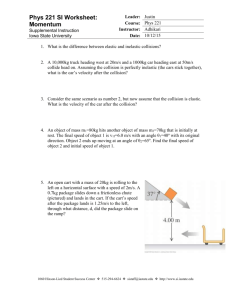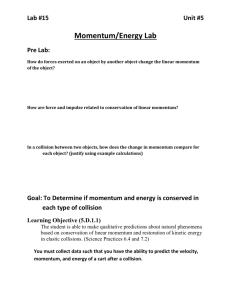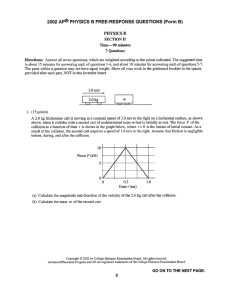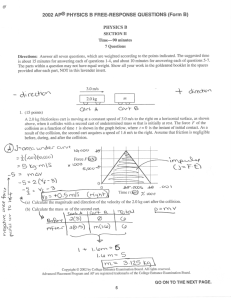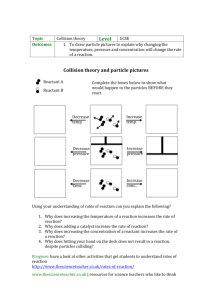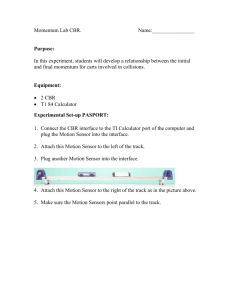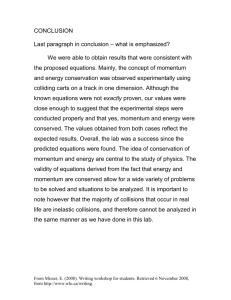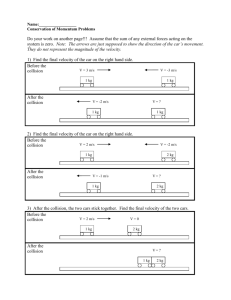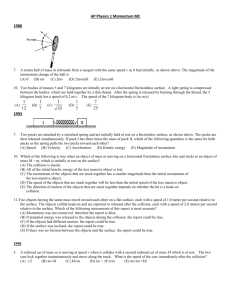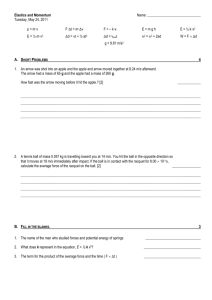Conservation of Momentum PES 1150 Prelab Questions
advertisement
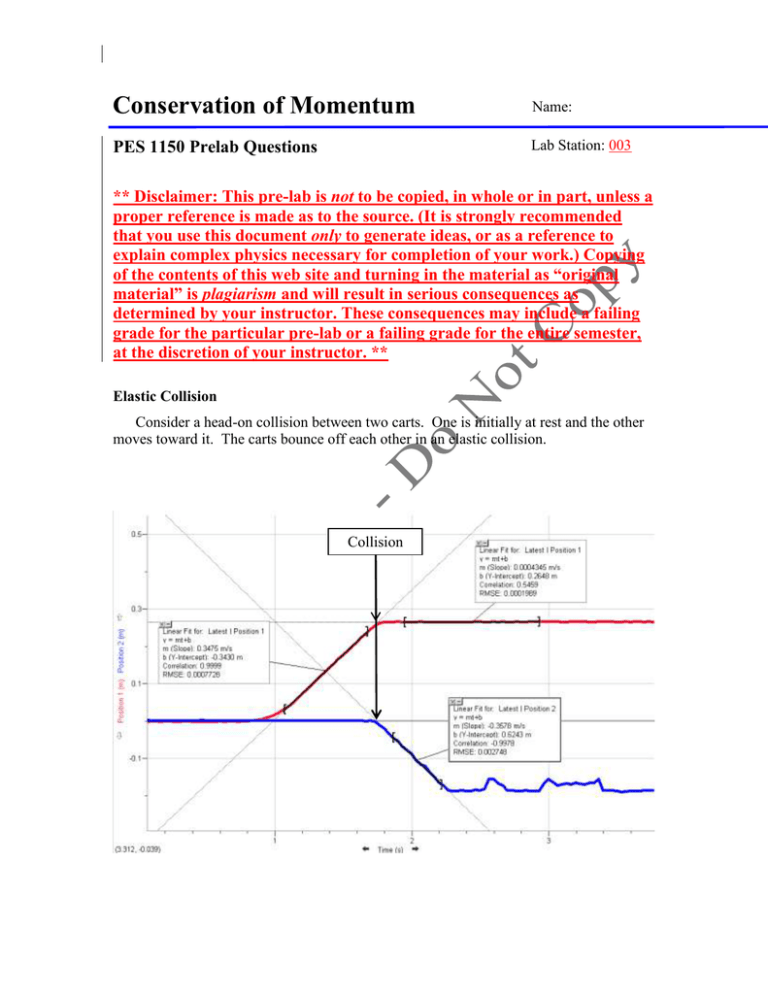
Conservation of Momentum Name: PES 1150 Prelab Questions Lab Station: 003 ** Disclaimer: This pre-lab is not to be copied, in whole or in part, unless a proper reference is made as to the source. (It is strongly recommended that you use this document only to generate ideas, or as a reference to explain complex physics necessary for completion of your work.) Copying of the contents of this web site and turning in the material as “original material” is plagiarism and will result in serious consequences as determined by your instructor. These consequences may include a failing grade for the particular pre-lab or a failing grade for the entire semester, at the discretion of your instructor. ** Elastic Collision Consider a head-on collision between two carts. One is initially at rest and the other moves toward it. The carts bounce off each other in an elastic collision. Collision Fill out the tables below and determine weather or not momentum is conserved. Mass of cart 1 Mass of cart 2 0.510 kg 0.498 kg Velocity of cart 1 before collision Velocity of cart 2 before collision Velocity of cart 1 after collision Velocity of cart 2 after collision (m/s) (m/s) (m/s) (m/s) 0.3475 0 0.000434 5 0.3578 Momentum of cart 1 before collision Momentum of cart 2 before collision Momentum of cart 1 after collision Momentum of cart 2 after collision Total momentum before collision Total momentum after collision (kg•m/s) (kg•m/s) (kg•m/s) (kg•m/s) (kg•m/s) (kg•m/s) 0.177225 0 0.0002215 95 0.1781844 0.177225 0.1784059 95 Ratio of total momentum after/before 1.0067 Show your work here Determining the velocity of Cart 1 before the collision: Using the best fit lines from Logger Pro, we are given the following equation for Cart 1 (red line) before the collision: m position 1 0.3475 t 0.3430 m s If we compare the equation for kinematic 2D motion for the x-position with the found trendline, we can easily see by evaluation that the following constants correlate directly: x vo , x t xo m x 0.3475 t 0.3430 m s Thus: vo , x [m/s] x o [m] 0.3475 -0.3430 Determining the velocity of Cart 1 after the collision: Using the best fit lines from Logger Pro, we are given the following equation for Cart 1 (red line) after the collision: m position 1 0.0004345 t 0.2648 m s If we compare the equation for kinematic 2D motion for the x-position with the found trendline, we can easily see by evaluation that the following constants correlate directly: x vo , x t xo m x 0.0004345 t 0.2648 m s Thus: vo , x [m/s] x o [m] 0.0004345 0.2648 Determining the velocity of Cart 2 after the collision: Using the best fit lines from Logger Pro, we are given the following equation for Cart 2 (blue line) after the collision: m position 2 0.3578 t 0.6243 m s If we compare the equation for kinematic 2D motion for the x-position with the found trendline, we can easily see by evaluation that the following constants correlate directly: x vo , x t xo m x 0.3578 t 0.6243 m s Thus: vo , x [m/s] x o [m] 0.3578 0.6243 ** [NOTE: By examining the setup of the system (see comments above), we can see that the second sensor will record a negative velocity toward the sensor for cart 2. We then must change its sign to compensate for the direction the cart is actually moving. Recall that a velocity is both a magnitude and direction – so both must be carefully considered when analyzing momentum problems.] ** Determining the momentum of Cart 1 before the collision: We know that momentum is given by: p mv Using the velocity we found from above, we can plug everything right into the equation for momentum. m p1,before 0.510 kg 0.3475 0.177225 N s s p1,before 0.177225 kg m s Determining the momentum of Cart 1 after the collision: m p1,after 0.510 kg 0.0004345 0.000221595 N s s p1,after 0.000221595 kg m s Determining the momentum of Cart 2 after the collision: m p 2,after 0.498 kg 0.3578 0.1781844 N s s p 2,after 0.1781844 kg m s Determining the total momentum before the collision: n pTotal,before pi ,before p1,before p 2,before i 1 kg m kg m pTotal,before 0.177225 0 s s pTotal, before 0.177225 kg m s Determining the total momentum after the collision: n pTotal,after pi ,after p1,after p 2,after i 1 kg m kg m pTotal,after 0.000221595 0.1781844 s s pTotal,after 0.178405995 kg m s Determining the ratio of total momentums (After/Before): Ratio of total momentums Ratio of total momentums pTotal,after pTotal,before kg m s 1.0067 kg m 0.177225 s 0.178405995 Since the ratio of the total momentum is nearly exactly 1, this means momentum is conserved, and the theory holds true. Inelastic Collision Consider a head-on collision between two carts. One is initially at rest and the other moves toward it. The carts stick to each other in an inelastic collision. Collision The carts stick together so for best results average the final velocities. Fill out the tables below and determine weather or not momentum is conserved. Mass of cart 1 0.510 kg Mass of cart 2 0.498 kg Velocity of cart 1 before collision Velocity of cart 2 before collision Velocity of cart 1 after collision Velocity of cart 2 after collision (m/s) (m/s) (m/s) (m/s) 0.3893 0 0.18865 0.18865 Momentum of cart 1 before collision Momentum of cart 2 before collision Momentum of cart 1 after collision Momentum of cart 2 after collision Total momentum before collision Total momentum after collision (kg•m/s) (kg•m/s) (kg•m/s) (kg•m/s) (kg•m/s) (kg•m/s) 0.198543 0 0.0962115 0.0939477 0.198543 0.1901592 Ratio of total momentum after/before 0.95777 Show your work here Determining the velocity of Cart 1 before the collision: Using the best fit lines from Logger Pro, we are given the following equation for Cart 1 (red line) before the collision: m position 1 0.3893 t 0.3021 m s If we compare the equation for kinematic 2D motion for the x-position with the found trendline, we can easily see by evaluation that the following constants correlate directly: x vo , x t xo m x 0.3893 t 0.3021 m s Thus: vo , x [m/s] x o [m] 0.3893 -0.3021 Determining the velocity of Cart 1 after the collision: Using the best fit lines from Logger Pro, we are given the following equation for Cart 1 (red line) after the collision: m position 1 0.1869 t 0.003447 m s If we compare the equation for kinematic 2D motion for the x-position with the found trendline, we can easily see by evaluation that the following constants correlate directly: x vo , x t xo m x 0.1869 t 0.003447 m s Thus: vo , x [m/s] x o [m] 0.1869 -0.003447 Determining the velocity of Cart 2 after the collision: Using the best fit lines from Logger Pro, we are given the following equation for Cart 2 (blue line) after the collision: m position 2 0.1904 t 0.2773 m s If we compare the equation for kinematic 2D motion for the x-position with the found trendline, we can easily see by evaluation that the following constants correlate directly: x vo , x t xo m x 0.1904 t 0.2773 m s Thus: vo , x [m/s] x o [m] 0.1904 0.2773 ** [NOTE: By examining the setup of the system (see comments above), we can see that the second sensor will record a negative velocity toward the sensor for cart 2. We then must change its sign to compensate for the direction the cart is actually moving. Recall that a velocity is both a magnitude and direction – so both must be carefully considered when analyzing momentum problems.] ** Determining the average velocity of the two carts after the collision: v v1 v 2 2 0.1869 m m 0.1904 s s 0.18865 m 2 s Determining the momentum of Cart 1 before the collision: We know that momentum is given by: p mv Using the velocity we found from above, we can plug everything right into the equation for momentum. m p1,before 0.510 kg 0.3893 0.198543 N s s p1,before 0.198543 kg m s Determining the momentum of Cart 1 after the collision: m p1,after 0.510 kg 0.18865 0.0962115 N s s p1,after 0.0962115 kg m s Determining the momentum of Cart 2 after the collision: m p 2,after 0.498 kg 0.18865 0.0939477 N s s p 2,after 0.0939477 kg m s Determining the total momentum before the collision: n pTotal,before pi ,before p1,before p 2,before i 1 kg m kg m pTotal,before 0.198543 0 s s pTotal,before 0.198543 Determining the total momentum after the collision: kg m s n pTotal,after pi ,after p1,after p 2,after i 1 kg m kg m pTotal,after 0.0962115 0.0939477 s s pTotal,after 0.1901592 kg m s Determining the ratio of total momentums (After/Before): Ratio of total momentums pTotal,after pTotal,before kg m s 0.95777 Ratio of total momentums kg m 0.198543 s 0.1901592 Since the ratio of the total momentum is nearly exactly 1, this means momentum is conserved, and the theory holds true.
